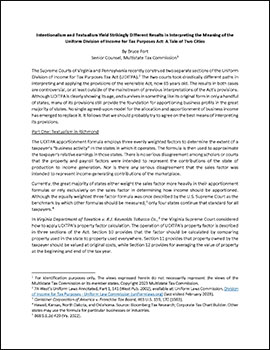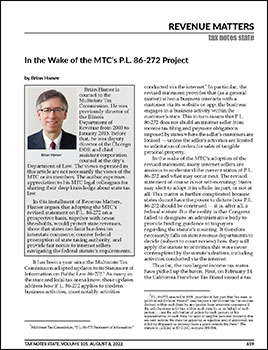News & Information
A Tale of Two Cities
Bruce Fort is Senior Counsel to the Multistate Tax Commission. In this article, originally published in Law 360’s State and Local newsletter on March 28 and 29, 2023, Fort describes two recent appellate decisions that took very different approaches to construing...
In the Wake of the MTC’s P.L. 86-272 Project
In August 2021, the Commission adopted revisions to its “Statement Concerning Practices of the Multistate Tax Commission and Signatory States Under Public Law 86-272.” These revisions explain (among other things) how P.L. 86-272, a federal statute that limits the...
Glenn Hegar, Comptroller of Public Accounts of the State of Texas v. Texas Entertainment Association, Inc.
On April 15, the MTC filed an amicus brief on petition for certiorari in the United States Supreme Court in the case of Glenn Hegar, Comptroller of Public Accounts of the State of Texas v. Texas Entertainment Association, Inc. The issue in the case is how to...
VAS Holdings v. Commonwealth
Bruce Fort is Senior Counsel to the Multistate Tax Commission. The views expressed herein are his and those of his legal colleagues at the MTC. They do not necessarily reflect the views of the Multistate Tax Commission or its member states. Would-Be Privateers...
Quad Graphics, Inc. v. North Carolina Department of Revenue
The Multistate Tax Commission has filed an amicus brief in support of the North Carolina Department of Revenue’s appeal to the North Carolina Supreme Court in Quad Graphics, Inc. v. North Carolina Department of Revenue , Docket No. 407A21, of the North Carolina...
Upcoming Events
Quick Links
Programs & Resources


